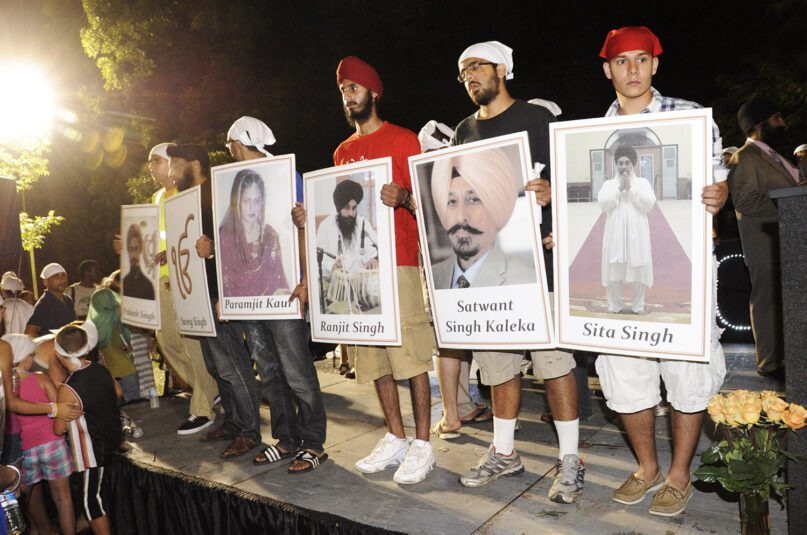(RNS) — Just weeks after his mother was one of seven killed by a white supremacist at a Sikh temple in Oak Creek, Wisconsin, Harpreet Singh Saini testified before a U.S. Senate Judiciary Committee in 2012 to lobby the federal government to start tracking hate crimes against Sikhs. He was 18 at the time.
“He killed my mother while she prayed. He shot and killed five more men. All of them were fathers and all of them had a turban like me. Now people know all of our names,” Saini said during his testimony. A seventh person later died from injuries sustained that day.
Saini recited the names of the victims and said: “This was not supposed to be our American story.
“I asked the government to give my mother the dignity of being a statistic,” Saini, 28, told Religion News Service.
RELATED: Remembering the Oak Creek tragedy
Three years after that, the FBI began to officially track hate crimes motivated by anti-Sikh bias.
Now, to commemorate the 10th anniversary of the Aug. 5 mass shooting at the Sikh Temple of Wisconsin — which remains the deadliest act of anti-Sikh hate in U.S. history — Sikhs are standing in solidarity with other faith communities that have since fallen victim to mass gun violence and white supremacy.
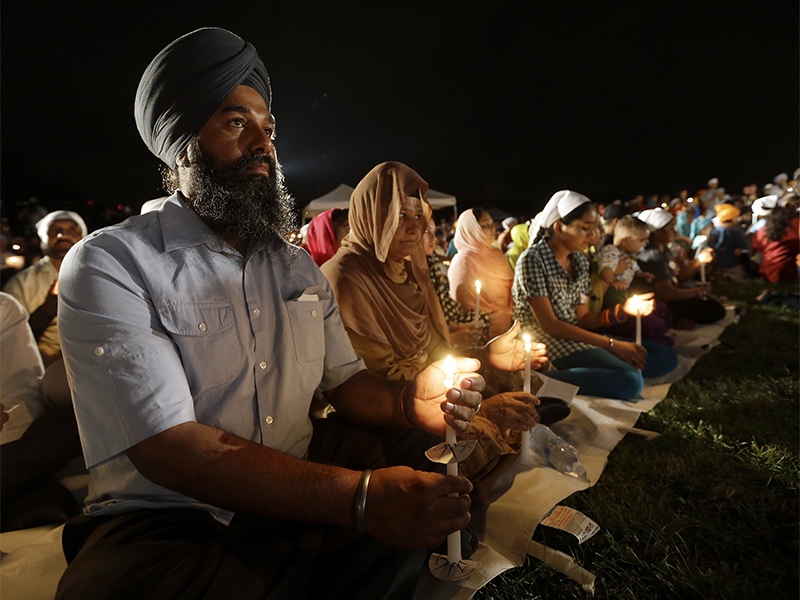
Raghu Vinder listens to speakers during a candlelight vigil in the parking lot of the Sikh Temple of Wisconsin on Aug. 5, 2013, in Oak Creek, Wisconsin, marking the one-year anniversary of the shooting rampage. (AP Photo/Morry Gash)
The temple, or gurdwara, will hold a 48-hour continuous prayer service beginning Friday (Aug. 5). It also plans to host an interfaith bridge building workshop, a “Who are Sikhs?” presentation and turban tying demonstrations. A candlelight vigil on Friday will honor those who died 10 years ago. Religious leaders along with local and federal law enforcement officials will also discuss ways to respond to hate crimes against places of worship.
Since the shooting, the Sikh Coalition has encouraged its supporters throughout the country to devote at least one day each year to seva, or selfless service. The National Day of Seva has been ongoing since 2013 to honor the lives lost at Oak Creek, and this year, Sikhs and their supporters are hosting community service events in cities across the country, from Los Angeles and Salt Lake City to Indianapolis and Detroit. Volunteers will be serving hot meals, providing school supplies and planting trees.
They’re also urging Congress to move forward with three pieces of legislation that seek to protect minority religious communities. One measure would expand the availability of information on domestic terrorism. Another would provide federal grants for houses of worship seeking to increase building security. The third would close a loophole barring the Justice Department from prosecuting certain hate crimes.
RELATED: Most Americans are clueless about Sikhs
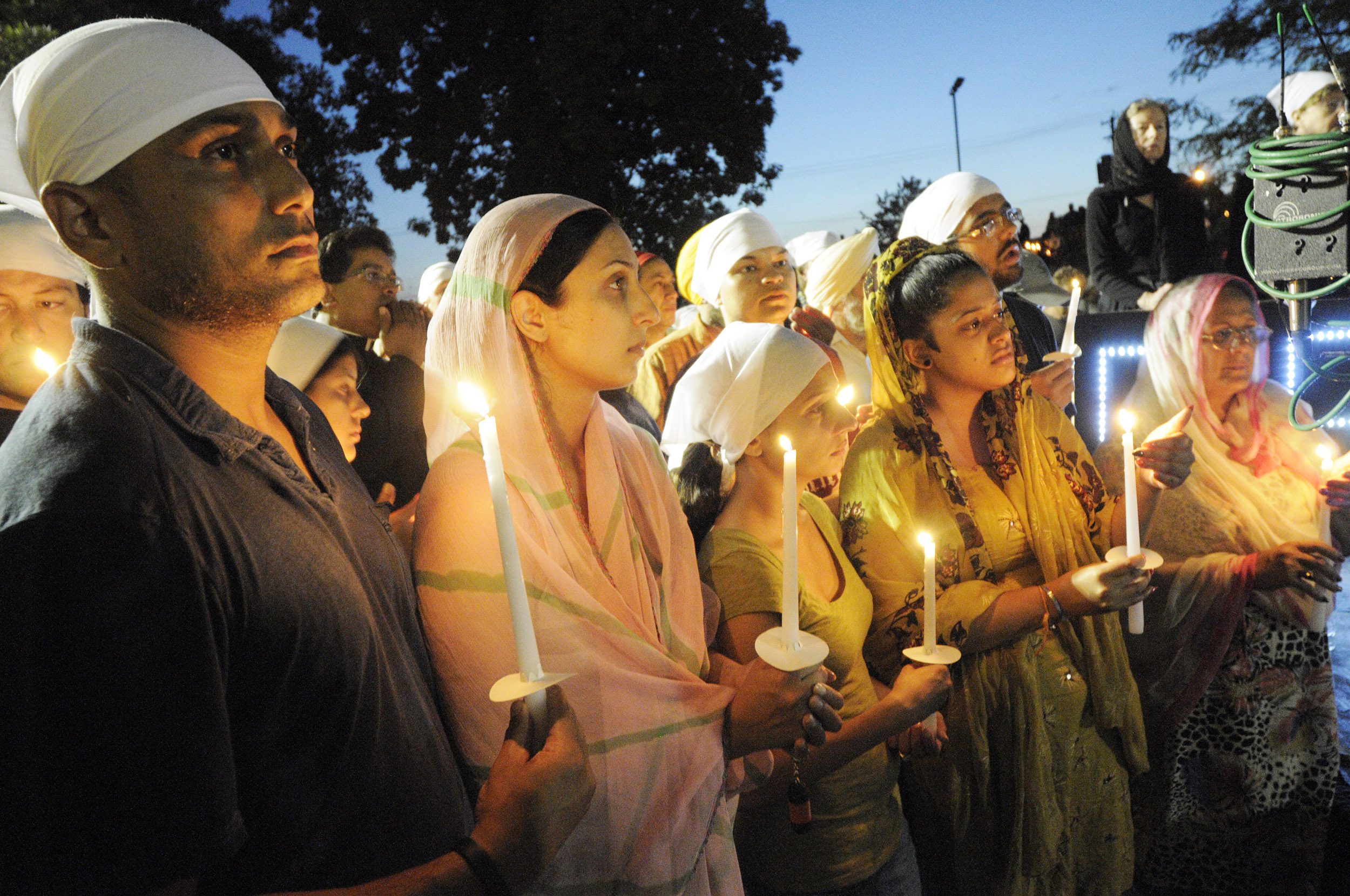
Pardeep Kaleka, far left, stands with his wife, Jaspreet Kaleka, and other family members at the Oak Creek vigil for victims of the Sikh Temple shootings. Pardeep’s father, Satwant Singh Kaleka, was killed in the shooting. Photo by Ernie Mastroianni photo, courtesy of Sikh Coalition
To Rucha Kaur, community development director for the Sikh Coalition, a big “part of the Sikh ethos is to step up and serve.”
“I think it’s important to make sure that we’re being inclusive. That we’re recognizing that hate and violence is a problem across many communities. I think it’s really important that we all stand in solidarity together,” Kaur said.
It’s also about celebrating the community’s resilience and the spirit of chardi kala, or eternal optimism, Kaur said.
“Just recognizing Oak Creek and remembering Oak Creek is really important. It often gets forgotten when we talk about such absolute mindless tragedies in this country,” Kaur said.
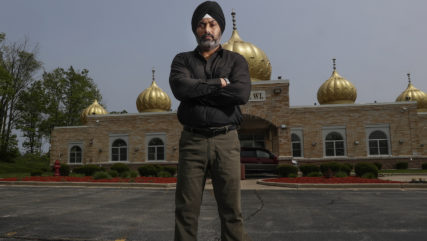
Pardeep Singh Kaleka poses for a picture at the Sikh Temple on June 1, 2019, in Oak Creek, Wisconsin. (AP Photo/Morry Gash)
Pardeep Kaleka, executive director of the Interfaith Conference of Greater Milwaukee, and civil litigator James L. Santelle view the Oak Creek attack as “a warning of the increasingly public and violent role that white supremacy would play in the next decade,” they wrote in a recent column in the Milwaukee Journal Sentinel.
Kaleka’s father, Satwant Singh Kaleka, was one of the people who lost their lives in the shooting.
In an online congressional hearing convened in late July by the Sikh Coalition, multiple clergy impacted by mass shootings spoke about the strength of interfaith connections, including Pastor Eric S.C. Manning of the Mother Emanuel A.M.E. Church in Charleston, South Carolina, where nine Black worshippers were shot and killed in a 2015 mass shooting; and Rabbi Jeffrey Myers of Tree of Life Synagogue in Pittsburgh, where 11 worshippers were gunned down in 2018.
Myers said that soon after tragedy struck at his synagogue, “the Sikh community reached out to us instantly — both locally and nationally.”
“That’s when I came to learn that we have so much more in common than what separates us. They warmly welcomed me to a club that no one wants to belong to,” Myers said. “I came to realize there was much strength I can draw upon from that community, to help me in my process of grieving and moving forward.”
Manning began as pastor for Mother Emanuel a year after the shooting occurred at his church. Manning talked about ministering to the church that was “in recovery,” and recalled that when the shooting happened at Tree of Life, he reached out to Myers “to lend a voice and to say that we’re here.”
“One thing that I understood when I came to serve Mother Emanuel, is that there were not that many folks who I was able to reach out to, to learn from,” he said.
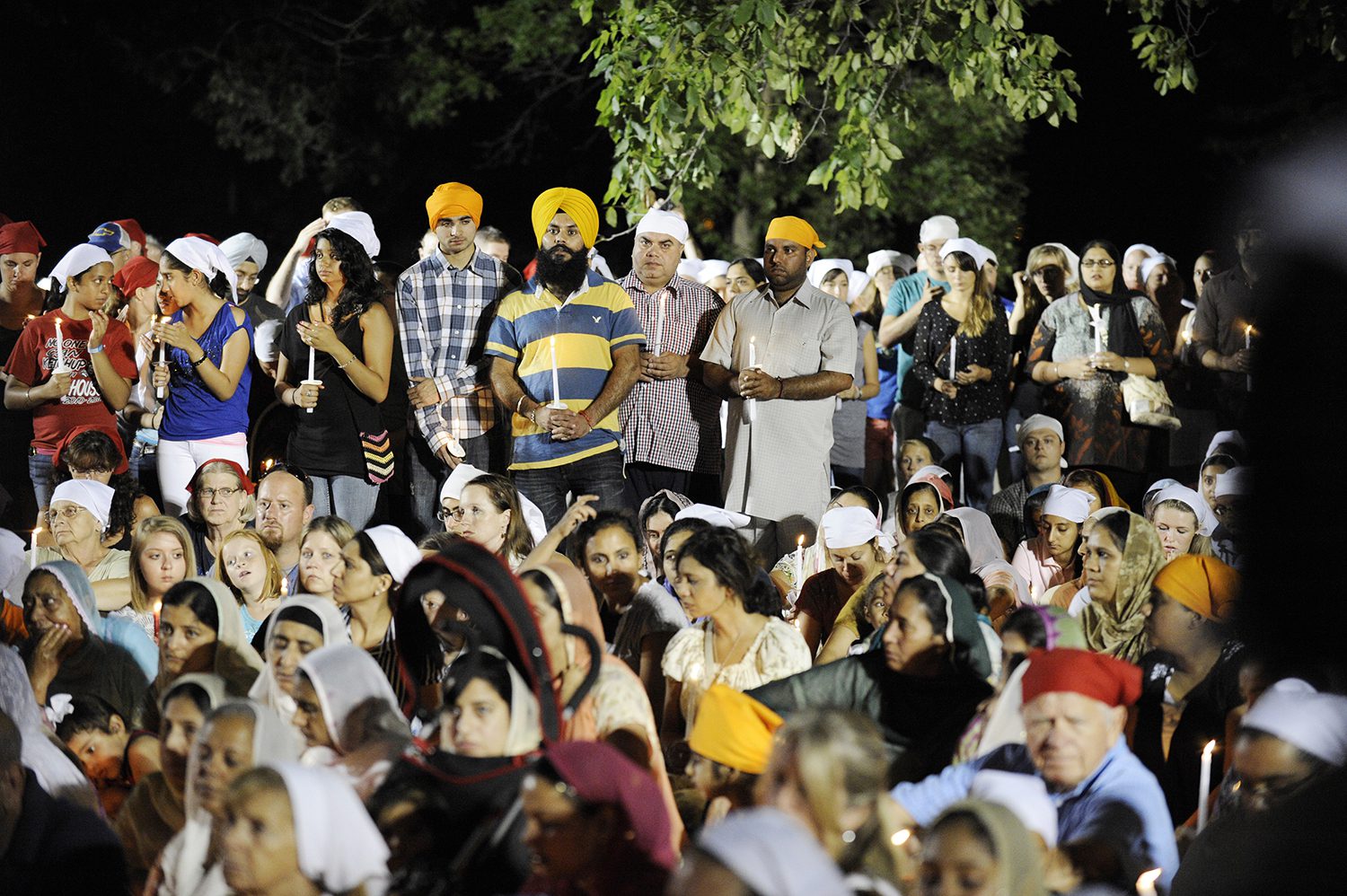
Community members joined the Sikhs by wearing head coverings during the vigil in Oak Creek, Wisconsin, on Aug. 7, 2012. Photo by Ernie Mastroianni photo, courtesy of Sikh Coalition
Manning said the church began to embrace a ministry of presence to stand with communities “who go through these type of hateful acts where racism comes up and we are murdered because of either our religious affiliation, our color.”
“I try to be there to listen and to be a part of the collective body — to share and to say, ‘enough is enough,'” Manning said.
For Saini, one consequence of the shooting that killed his mother is that Sikhs have to be more cautious. The gurdwara now has a security guard. “This is sad because gurdwaras are supposed to be open to anyone.”
“Sometimes it feels like what happened in Oak Creek was ignored,” Saini, who was also present at the July congressional hearing, said during the briefing. “It has been really painful to watch other communities like Pittsburgh and Charleston go through what we went through.”
Saini thinks back to his testimony 10 years ago and how it was supposed to be his older brother speaking that day. Saini had a hard time grieving after the shooting and said his brother recommend he testify as a way to cope with their mother’s death and “get his feelings out.”
Saini holds on to a joyous memory of traveling with his mother to India just before the shooting happened. His mother was warm and loving and “gave her all everyday” to provide for her sons, Saini said.
“For those of us who lost loved ones, it means missing them and honoring their memories every day,” he said.
